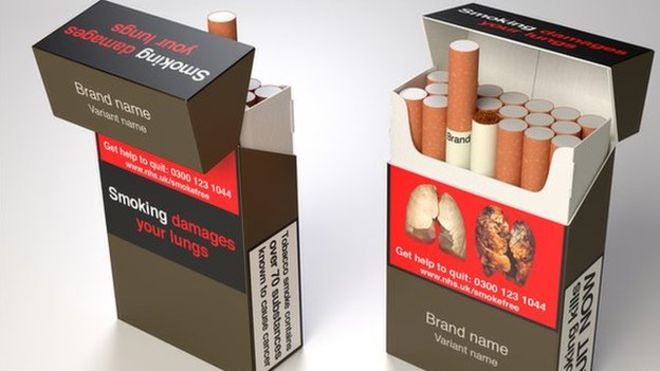Several big tobacco firms have lost a second challenge to the government’s plain-packaging rules.
Following the defeat at the High Court, on the eve of the new regulations coming into force in May, companies, including British American Tobacco, Imperial Tobacco and Japan Tobacco International, took the case to the Court of Appeal saying the regulations violated UK and EU law, eliminating valuable property rights by rendering tobacco products indistinguishable.
The UK is the first country in Europe to require cigarettes to be sold in plain, standardised packaging, and the government has said it means a generation will “grow up smoke-free”.
However, the challenge was rejected by three judges who said the Health Secretary had “lawfully exercised his powers”.
Under the new rules cigarette companies can no longer brand their products and health warnings take up 65% of the front and back of the pack. Packets of 10 cigarettes, which do not have enough room for the health warnings, are banned completely.
Tobacco companies and retailers have a year to clear old stock and replace with the new standardized packs – after that period, they will risk penalties for distributing/selling the products in the branded packs.
Interestingly, whilst many consumers (and even more non smokers) are under the impression that the packaging rules are limited to the product packaging only, the scope of the government’s plain-packaging rules are far wider and also include standardised formats for the cigarette sticks themselves.
The full government’s plain-packaging rules can be downloaded here: https://www.gov.uk/government/uploads/system/uploads/attachment_data/file/579889/Tobacco_Packaging_Guidance.pdf
Deborah Arnott, chief executive of health charity ASH, said: “This is a victory for public health and another crushing defeat for the tobacco industry.
“This ruling should also encourage other countries to press ahead with standardised packaging, now that the industry’s arguments have yet again been shown to be without foundation.”
But Simon Clark, director of the smokers’ group Forest, said the government was targeting the consumer as well as the tobacco industry with the new rules.
“Plain packs are unlikely to stop people smoking but the impact on consumer choice could be significant because some brands will almost certainly disappear from the market.
“Tobacco is a legal product. The law should not impose excessive regulations on consumers who know the health risks and don’t need this type of finger-wagging measure.”










